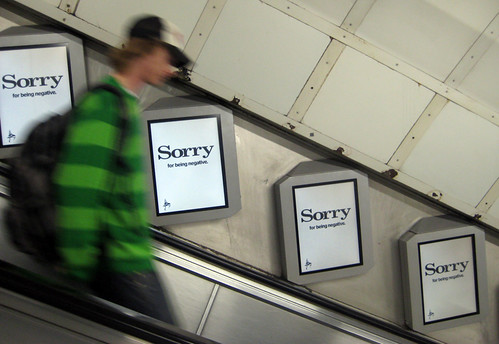Evening Standard Sorry Tube Campaign by Annie Mole
Is it just me that finds The Evening Standard‘s “Sorry” campaign toe-curlingly uncomfortable?
Perhaps it’s because I work in newspapers, but I think my awkwardness stems from being mildly embarrassed at witnessing such public self flagellation.
The medium is responsible for this to some degree: advertising boards aren’t really the best for a frank and humble discussion with your readers. All The Standard can do in this space is to continue shouting loudly at you about how very sorry it is.
One opinion is that the campaign recognises that we now live in a world of transparency:
“Trust has gone – look at the government and banks. Where we are now, brands have to admit their mistakes.” says Mark Borkowski, founder of Borkowski PR.
I am absolutely happy to be corrected, but I don’t believe this campaign gets anywhere near being transparent or does much to build trust. In fact, I wonder how many employees of The Standard would say it even represents their reality.
Perhaps a better way to say you’re sorry (if you really are) is to modify your behaviour and get on with trying to be good.


It was annoying that there was only a Sorry without a list of things they were going to do to change that. But all the Sorry ads have no gone, replaced with ‘Promise’ ads, which should be explained in the paper tonight, I guess. Well, they’ve giving it away tonight, so guessing there’ll be some explanation
This is interesting to me because the main criticism I’ve seen of the plague of free papers in London these days is not that they’re crap or a little problem (though these are issues) but that they seem to actively hate London. Since the Standard and Metro are from the Mail stable (where hate is good) I’m intrigued to see how this plays out. Has their marketing research picked up on this?
As to your point, yes, actions are more important than advertising slogans.
I saw a few of these and took them as a facetious commentary on current events and behaviours. Nothing to do with the Standard itself. Have I read incorrectly? Or should I say, ‘Sorry’?
@dp I’m afraid it is a genuine campaign, explained here by Geordie Greig.
But, as Rachel says, it is part one of a two-parter. I haven’t seen any of the “Promise” adverts yet.
Typo in my comment:
little problem = litter problem
@Joanna That Guardian interview is fascinating. I didn’t realise the Standard was no long part of the Mail stable. Makes perfect sense now. Clean slate.
@Pete So you’re cool with the advertising? It doesn’t matter how much I sympathise with what it’s trying to do, it just doesn’t sit right with me.
Pingback: Cool stuff - May 11, 2009 — Danny Whatmough.com
(A week later)
Allowing for the fact that I dislike advertising generally and its for a paper I don’t read in a city I don’t live in so it’s not aimed at me and probably wouldn’t be aimed at me if I was living in that city…
I think the campaign is interesting. It treats the readers as adults who have a choice as to where they get their news (the Standard only has a monopoly in print, freesheets excluded) and shows some humility. Newspapers are usually so paranoid about not being seen to be wrong about something that they never say sorry unless they really really have to (and even then it’s often qualified into meaninglessness) so this is grabs the attention.
As for the employees of the Standard… Well, they used to work for Associated Press. In my opinion a lot of them should have said sorry a long time ago. 😉